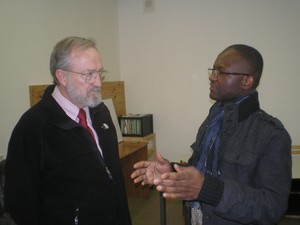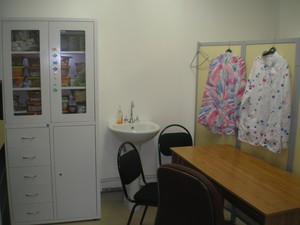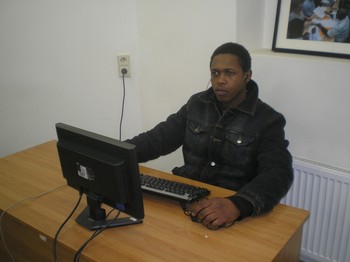Even though it has moved three times in the last four years, the Parish Center of the Moscow Protestant Chaplaincy (MPC) here is easy to find for those who need it.
“Almost everything is consolidated here now,” says Daniel Ekat, a native of Cameroon who has lived here for 11 years. He is the food-sharing and Parish Center director for MPC, the English-language Protestant church in Moscow which is celebrating its 50th anniversary this fall. MPC is co-sponsored by five U.S. denominations ― the Presbyterian Church (U.S.A.), the United Methodist Church, the Evangelical Lutheran Church in America, the Reformed Church in America and the American Baptist Churches.
Since it moved out of the U.S. embassy in 1992, shortly after the collapse of the Soviet Union , and since 1991 has engaged in a variety of social ministries. It helps pensioners, children, refugees and immigrants in areas of hunger, poverty and displacement.
The Parish Center houses a medical advice center, a computer lab, a food distribution site and a place where people “can just hang out, read, take a shower and connect with others,” Ekat says.

Daniel Ekat shows Gary Payton, the PC(USA)’s regional liaison for Russia, Belarus, Poland and Armenia, the new Parish Center of the Moscow Protestant Chaplaincy. —Jerry Van Marter
Most Parish Center visitors are African immigrants ― many of them students ― who face a tough life in Russia’s capital, where rampant discrimination too frequently turns into violence.
“We used to have many more students,” Ekat says, “but now not so many ― fewer are coming to Russia to study. There is very little support for them here so they’re really fighting for their lives.”
About 10 years ago, in response to ubiquitous violent attacks on Africans in Moscow’s streets, MPC formed a Racial Violence Task Force that documented attacks and put pressure on city authorities to take action against perpetrators.
“There’s a big difference between now and four years ago,” Ekat says. “Then there was an attack every three or four days. Now maybe one a month and mostly by drunkards.” Moscow authorities attribute much of the decreased violence to the MPC program.
The computer center provides computers for people to use to do homework, access government services and apply for jobs. The Parish Center also offers Russian and English language classes. In addition to African immigrants, Ekat says, “some Russians who attend MPC come for the English classes so they can understand the sermons better on Sundays.”
The sparkling medical advice center is staffed two days a week by Canadian and Nigerian nurses and Russian doctors. It serves between 30 and 50 people each week. “If someone is really bad off,” Ekat says, “the doctors call emergency or refer them to a clinic where they can see a specialist.”

MPC’s medical clinic serves some 200 patients a month. —Jerry Van Marter
MPC’s social ministries began more than 20 years ago with a soup kitchen for Russian pensioners, whose incomes have lagged far behind inflation. With help from volunteers from the nearby German embassy, MPC’s soup kitchen has served more than 2 million hot meals over the years.
The Parish Center also distributes food bags ― an average of 200 per month. “What we are seeing now is more families coming in for food rather than just pensioners,” says Ekat. “Food prices fluctuate so much that the need goes up and down.”
Demand for MPC’s social services continues to grow given Russia’s tough economy. Ekat is unbowed. “We see too many lives transformed to ever think of giving up,” he says.
-----
To contribute to the ministry of the Moscow Protestant Chaplaincy, click here.
Editor's Note: This article was updated Sept. 3, 2015 to reflect recent security concerns.

